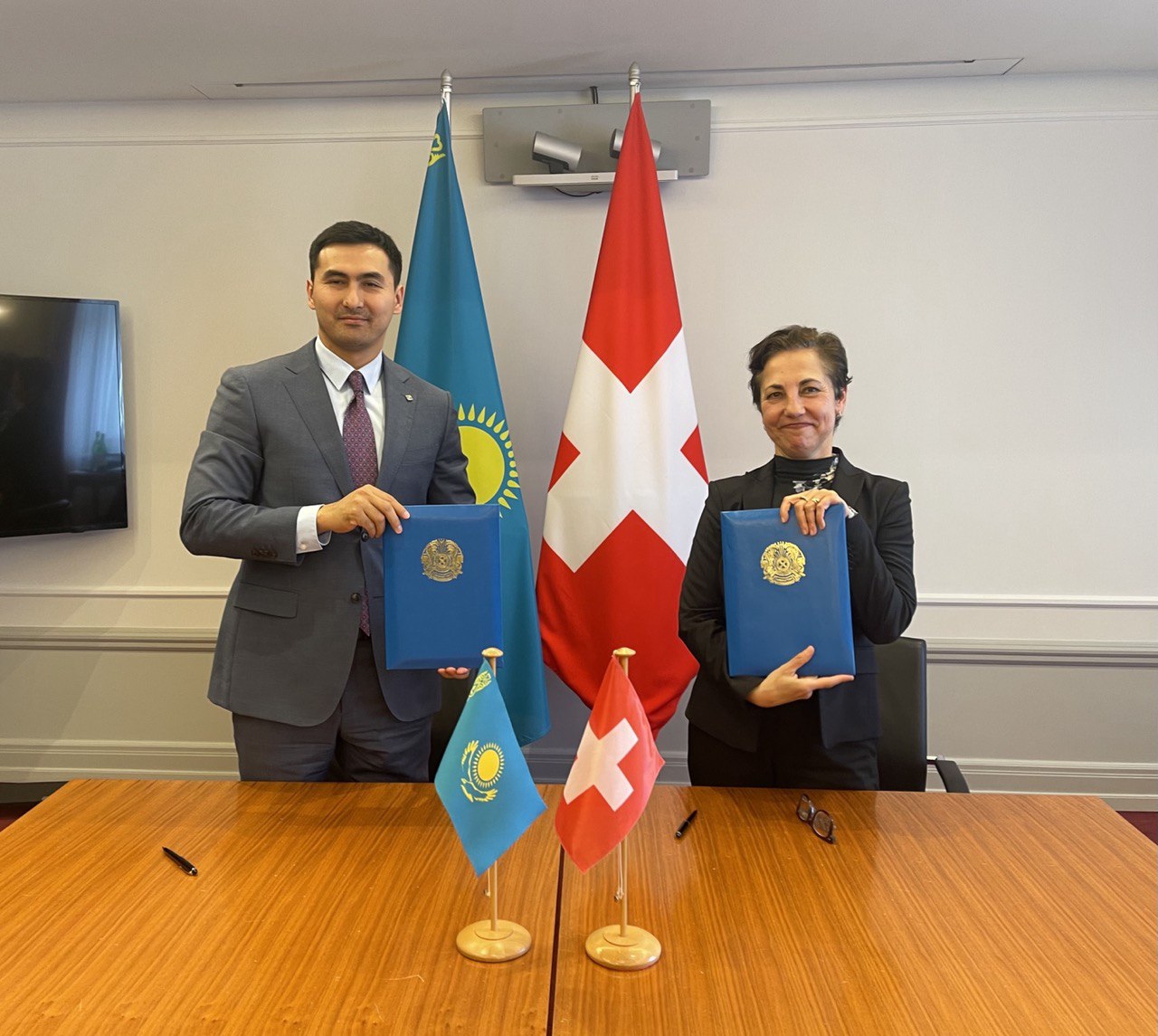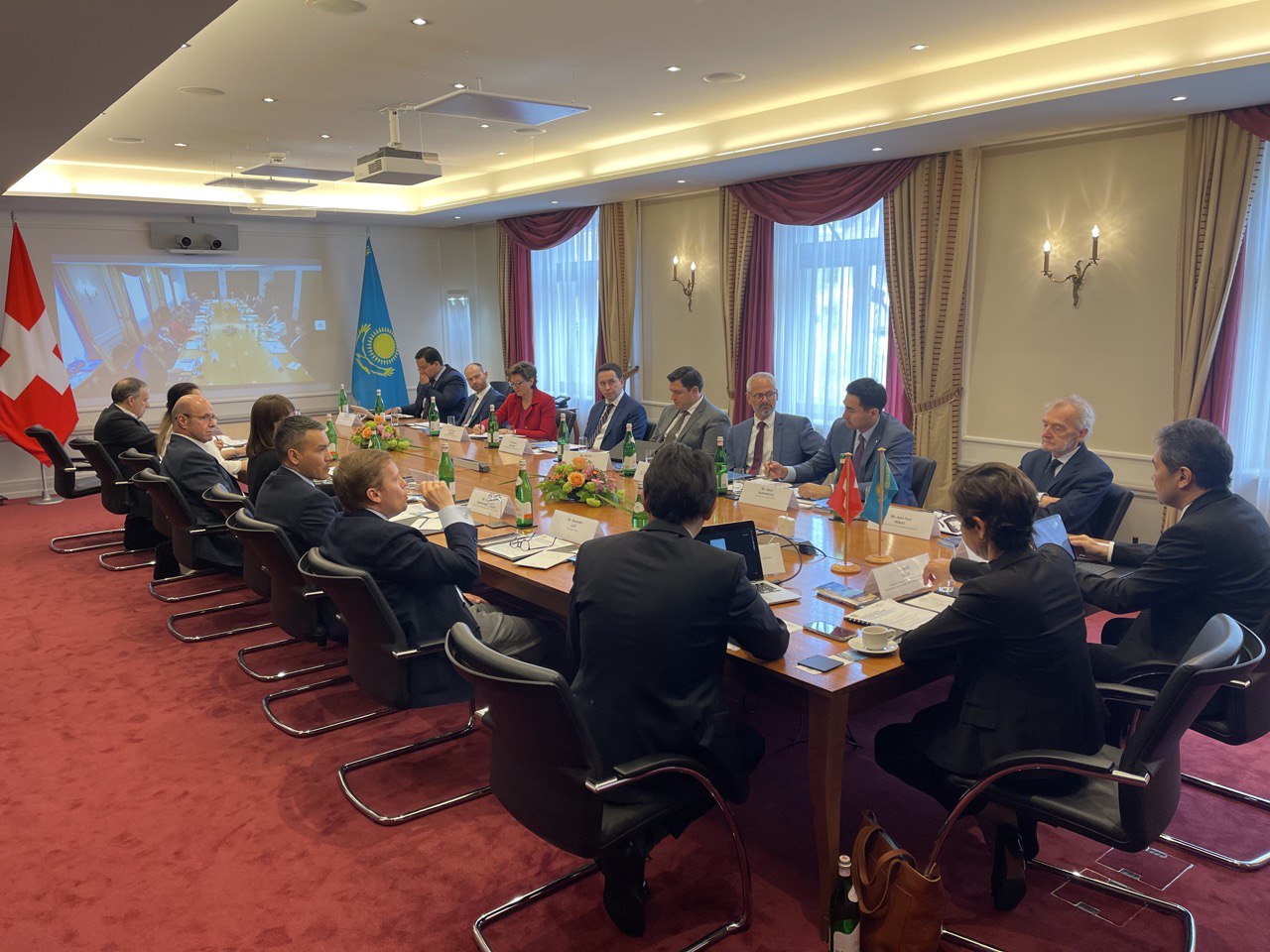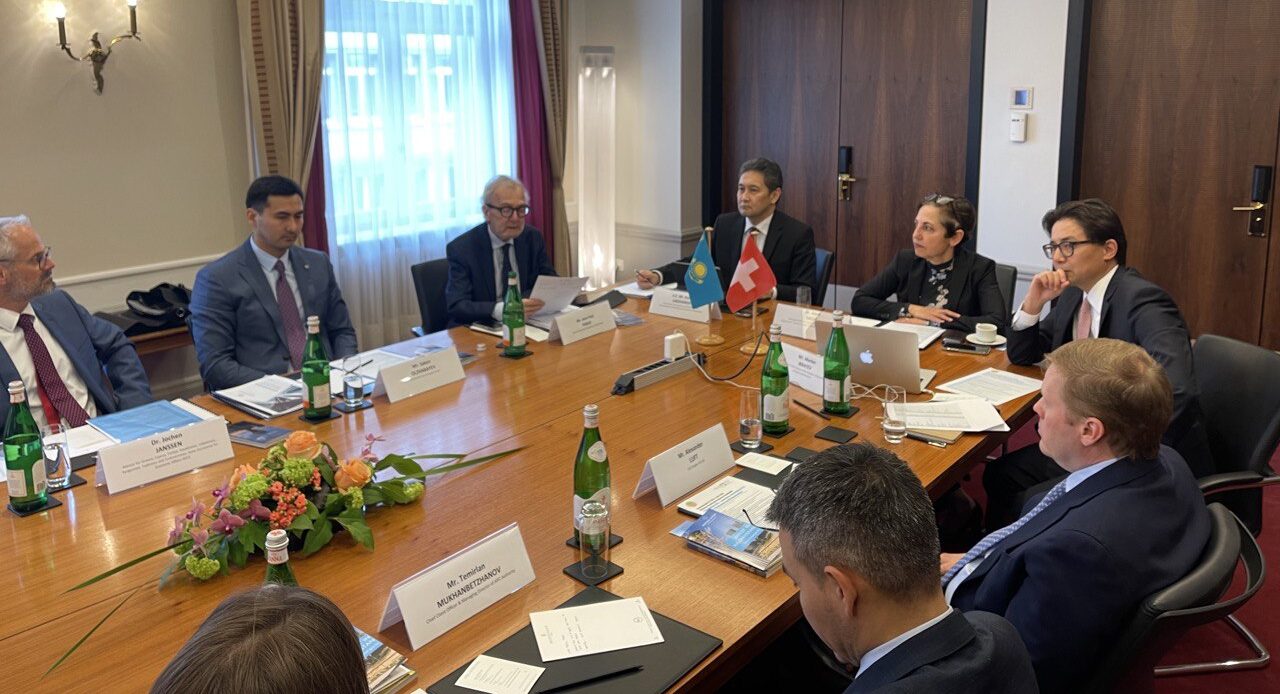ASTANA – Kazakh Embassy in Switzerland and the Switzerland-Eastern Europe, Central Asia, South Caucasus Joint Chamber of Commerce (JCC) organized an investment roundtable on April 27 to address business opportunities in Kazakhstan.

Kazakh Invest Representative Saken Olzhabayev and JCC Managing Director Dorit Sallis sign a memorandum of understanding. Photo credit: Kazakh Embassy in Switzerland.
As part of the meeting, the Kazakh Invest national company and JCC signed an agreement to expand cooperation between Kazakhstan and Switzerland.
The hybrid event titled Kazakhstan 2023 – Launching a New Business Era: Reform, Privatization and Foreign Direct Investment (FDI) Opportunities took place on the eve of the 11th meeting of the intergovernmental economic commission in Astana on June 28 and the visit of Swiss Foreign Minister Ignazio Cassis to Kazakhstan at the beginning of July. The meeting was moderated by JCC Managing Director Dorit Sallis.
“Kazakhstan is definitely a key partner for us in Central Asia. Switzerland is Kazakhstan’s fifth biggest trading partner and a third biggest investor,” said JCC President and Honorary Consul of Kazakhstan in Switzerland Jean-Paul Periat.
Switzerland is Kazakhstan’s third largest foreign investor with $2.8 billion in 2022, following the Netherlands and the United States. Overall, Swiss-based companies have invested nearly $32.7 billion into Kazakhstan’s economy since 2005.

Photo credit: Kazakh Embassy in Switzerland.
In his opening remarks, Kazakh Ambassador to Switzerland Kairat Sarzhanov noted there are more than 300 companies with the participation of Swiss capital operating in Kazakhstan, including well-known groups such as Glencore, Roche, SGS, Militzer and Munch, Philip Morris, Ammann Group, Nestle, Novartis, and Sika along with small and medium sized businesses (SMEs) like Inoks Capital, Rey Group, and Swissgrow.
“We encourage Swiss companies to invest in chemistry and pharmaceuticals, mechanical engineering, agriculture, food industry, transport, infrastructure, and logistics, as these sectors remain relevant today,” said Sarzhanov.
He also paid attention to the large-scale modernization program of Kazakhstan’s political reset, saying it “ensured the government’s accountability and transparency, making a huge step towards democratization.”
“The reforms aimed at macroeconomic stability, economic diversification, digitalization, SMEs development, human capital, and the rule of law contribute not only to the well-being of our nation, but also increase the attractiveness of the country’s investment climate,” he said.
Saken Olzhabayev, representing the Kazakh Invest national company, highlighted the country’s strategic access to major markets, abundant natural resources, business-friendly environment, qualified workforce, and state support provided by Kazakhstan’s Foreign Investors’ Council, Investment Ombudsperson, and Council on Improving Investment Climate.

Photo credit: Kazakh Embassy in Switzerland.
“In 2021, we introduced a new tool – a new investment agreement. In comparison with typical modern investment contracts, this agreement encompasses all the preferences in one document,” said Olzhabayev.
Astana International Financial Centre (AIFC) Chief Client Officer Temirlan Mukhanbetzhanov specified the key advantages of the AIFC system for foreign investors – English common law jurisdiction, world-class regulation standards, independent judicial system, and a special tax regime.
Kazakhstan’s 14 special economic zones and 36 industrial zones provide investors with special privileges, including the exemption from corporate income tax, value-added tax, land tax, and property tax.
Founder of the Europe and Central Asia Transport and Trade Association (ECATA) Leila Batyrbekova described distinguishing features of the Trans-Caspian International Transport Route (TITR), a priority for the Kazakh government in developing transport and transit potential.
“TITR is not an overland. TITR is a multimodal route, by its definition in 100 percent of cases running through the Caspian Sea, and partially through the Black Sea. As for the Northern Corridor [going through Kazakhstan and Russia and onwards to Europe], it is only a land route, which was mostly developed due to the Chinese subsidies,” said Batyrbekova.
According to her, the countries along the TITR route may be different depending on the type of cargo, the point of departure and the point of its destination. Both containerized cargoes and general, dry, liquid, and other cargoes in nearly all types of rolling stock move along the route.
Swiss companies also shared experience of working in Kazakhstan, their plans and expectations.
Founded in 1878, SGS, the Swiss multinational testing, inspection and certification company, has been operating in Kazakhstan for 30 years. The first office was opened in Almaty in May 1993. Last year, the company opened another office in Astana.
Adrian Ene, the company’s commercial manager, presented top projects in Kazakhstan, particularly the oil, gas and chemicals laboratory in Aktau, the quality control system for produced and shipped coal, and coal and geochemistry laboratories on-site management among others.
“We see the growing interest in hydrogen solutions as well. We are prepared to bring this knowledge to Kazakhstan and serve the market. We also see a lot of opportunities coming up in the on-site laboratory management and are ready to develop and bring our global expertise to local plants and productions, as well as our newest and latest equipment,” he said.
“With the recent developments, Kazakhstan has gained an absolutely new importance. It is becoming the Central Asian hub, which also means new logistics opportunities. Many of the U.S. and European companies stopped supplying the Russian market or even shut down their activities in Russia. Therefore, they go directly to Central Asia,” said Regional Managing Director for Middle East and Central Asia at the Militzer and Munch company Nikolaus Kohler.
Alexander Luft, CEO of the Stadler Rail CIS company, Swiss manufacturer of railway rolling stock, announced the launch of technology transfer and personnel training programs as part of the agreement with the Kazakhstan Temir Zholy national company for the production and maintenance of railway equipment in Kazakhstan. The document was signed in December last year.

